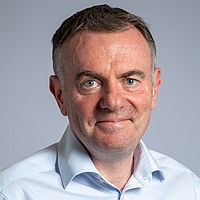It’s Time to Fix the Online World - Not Just Ban It
29 April 2025
The debate around young people’s use of smartphones and social media is growing, but banning technology isn't a realistic solution. In this blog, EBU Director General Noel Curran argues that we must focus instead on building a healthier digital environment - one where public service media provides young people with safe, enriching, and meaningful online spaces. He calls for greater visibility for trusted content, stronger accountability for platforms, and a collective effort to shape a digital world that supports young people's growth, values, and well-being.
The debate over children’s use of smart phones and social media has intensified in recent months. Urgent and necessary conversations are taking place across kitchen tables, classrooms, and the corridors of power on the effect online platforms are having on young people’s mental health, behaviour and values - and particularly the worrying impact of toxic, misogynistic influencers on young men.
But turning concern into action is proving more problematic.
One of the most talked-about ideas is a ‘digital age of consent’ - a proposal to ban smartphones and/or social media for under-16s. It's a suggestion born of an understandable and deep frustration. But is it realistic, even if it were enforceable?
The facts are startling. Research suggests teenagers are spending up to 7 hours a day on screens. That’s nearly half their waking hours immersed in digital life. Algorithms - built by very smart people in the tech world - are working overtime to make online experiences addictive, stimulating, and emotionally engaging. Recognition, inclusion, approval - they're the currency of adolescence, and platforms have gamified them with extraordinary precision. But without enough thought to the harm they may be inflicting on our children.
But online culture is not all inherently toxic. At its best, it’s expansive, creative, and empowering. It offers connection, identity, education and enjoyment. The challenge is can we build a better digital world rather than just ban it?
We need to try to reduce that 7 hours or at least try to ensure that more of them are spent engaging with high-quality, trustworthy content. And that’s where public service media can - and does - play a vital role.
Today, 85% of public service broadcasters across Europe have a dedicated online kid’s offer*1. These spaces are designed with young people’s development, safety, and curiosity in mind, not just their data. From imaginative dramas and documentaries, to interactive learning and pro-social online games, public service content offers something algorithms can’t: purpose, meaning, and care.
Just as importantly, public service media showcases healthy role models for young people - not toxic figures who thrive on outrage and division.
Keeping kids safe online is also a priority for public service media. 86% of our Members have media literacy activities*2 aimed at young people, such as VRT’s Slim op het internet (Smart on the internet) teaching kids how to deal with situations from catfishing to unsolicited photos, or NPO’s HackShield providing children with resources to better understand the information and risks they can encounter online. The list goes on across our membership in Europe.
We now need to make sure young people can find and discover all this content - not just the videos the platforms want them to click. That means governments must implement the principles set out in the Audiovisual Media Services Directive to make general interest content more visible on online platforms. It also means platforms must be held accountable for promoting toxic content, and for algorithms that push harmful ideologies.
Because when you destabilise an ecosystem, as the big tech platforms have, the ripple effects are wide. And what we’re seeing with some boys and young men today is one of the more scary ripples.
So let’s not retreat from the digital world. Let’s shape it. Let’s flood it with content that informs, inspires and includes. Let’s amplify the spaces that help young people grow, question, and connect.
That is not a call to unplug - but to rebuild.
*1 EBU-MIS based on 2024 Member’s data – 46 organizations with an online children offer and 38 organizations with an online youth offer (includes the ones who replied “partly”)
*2 EBU-MIS based on 28 responses to the PSM media literacy survey
Relevant links and documents
Written by







